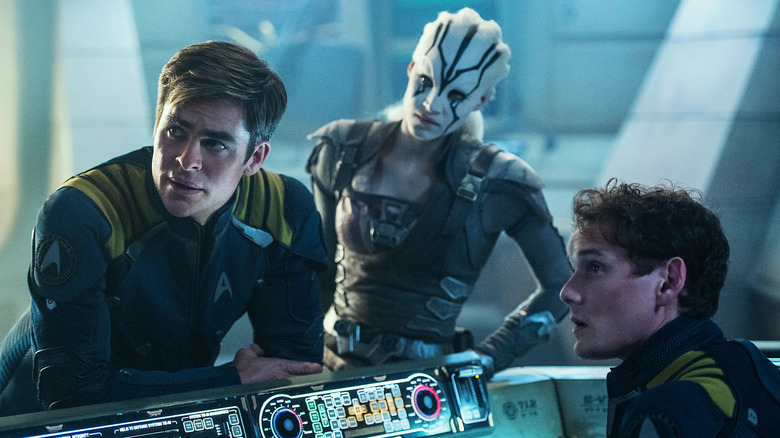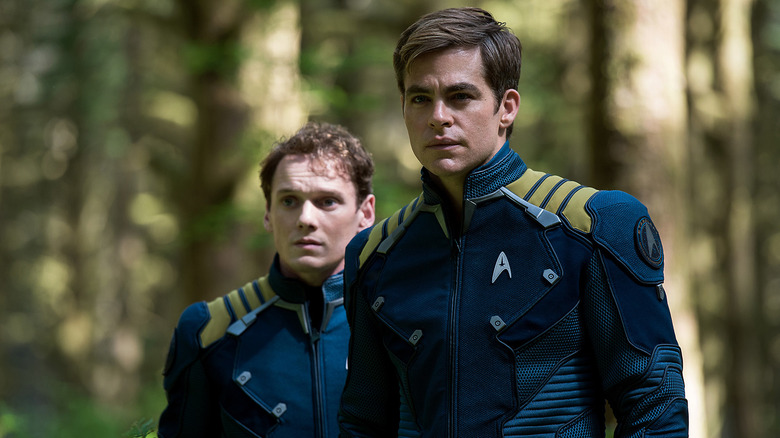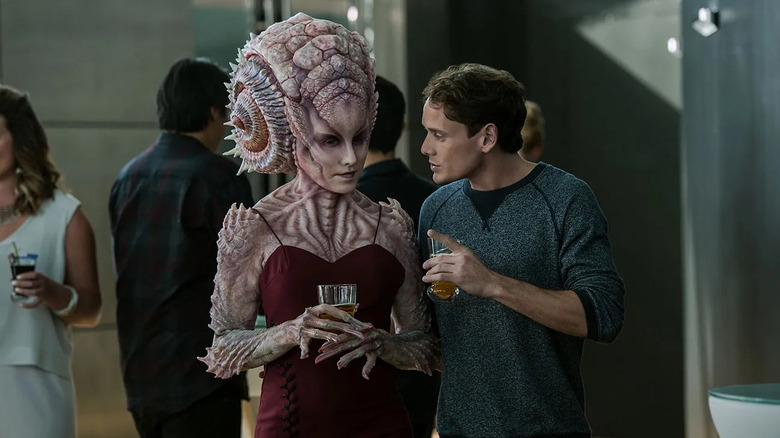Why Noah Hawley's Star Trek Movie Fell Apart
The arc of the cinematic Kelvin timeline of "Star Trek" is curious and, in retrospect, may only be considered a stop-gap in the franchise until it mustered up the money and the legal wherewithal to usher it back to television. The Kelvin-verse, it should be remembered, arrived into a post-9/11 world, and audiences were in no mood for the usual calm, intellectual, pacifism-and-diplomacy-forward tenets of "Star Trek" as it had been. Righteous, vengeful action was more the public's speed in the '00s, hence why superheroes rose to the top of popular culture during that decade. As such, Paramount put out J.J. Abrams' "Star Trek" in 2009, updating the franchise to look and feel more like "Star Wars."
Trek 2009 rebooted the franchise's timeline to depict younger, alternate versions of familiar TV characters from 1966. It also upped the battle and destruction quotient by a sizeable factor. The 2009 film was successful enough to warrant the sequels "Star Trek Into Darkness" in 2013 and "Star Trek Beyond" in 2016.
By 2016, however, "Star Wars" was rebooted in earnest and the public no longer had a need for a Wars-like Trek.
Since then, a fourth Kelvin-based Trek movie — or any additional Trek movie — has been a massive question mark. Quentin Tarantino was reportedly working on a Trek draft (!), as was S.J. Clarkson ("Madame Web"). In 2019, Noah Hawley ("Lucy in the Sky," the "Fargo" TV series) was hired to write and direct a 14th "Star Trek" movie, but in 2020 that project was put on hiatus. As of this writing, nothing appears to be in motion.
In a recent interview with the Hollywood Reporter, Hawley theorized why his Trek never took to the stars. He chalks it up to studio panic.
A change in management
Hawley also recalls experiencing an all-too-common death knell for most creative projects at major film studios: a change in management. It's common for entire projects to be shelved or canceled when a studio undergoes a regime change, as no new CEO wants to expend time or energy working on projects left over from the last CEO's docket. It's definitely significant that Viacom, which had previously seen its CBS and Paramount arms split apart, reunified in 2019.
For years, the TV arm of "Star Trek" and the movie arm of "Star Trek" were technically run by two different companies and any Treks put out by one arm had to remain legally distinct from Treks made by the other (hence the creation of an alternate timeline). After the re-merger, a fourth film in the Kelvin timeline seemed unnecessary, as all Treks were now back under the same umbrella. That management shift, Hawley noted, was certainly a factor in his own "Kelvin 4" film being nixed. He said:
"What I found with 'Star Trek' was I got onto the runway and then there was a managerial changeover. In retrospect, it's not that they killed the movie. It's that I got as far as I did with a wholly original idea, until someone said, 'Well, wait a minute, what are we even doing with this valuable IP? Just giving it to him to make up a story? That's not how corporate filmmaking works.' So, if the call came in to do a big franchise film again, it would have to come with a sense of, 'We want you to do your version of it.'"
The other all-too-familiar drum beat can be heard in Hawley's comments. He and the studio had (in unison now) creative differences.
The original idea for Star Trek XIV
One of the more consistent ideas through the production of "Star Trek XIV," — or is it merely "Star Trek Volume 2, #4?" — was that Captain Kirk (Chris Pine) would be able to, thanks to a time warp, interact with his deceased father George Kirk, played by Chris Hemsworth. Hemsworth wasn't a move star in 2009, but became a household name after the release of "Thor" in 2011, and the additional Marvel Cinematic Universe films he appeared in. Having Hemsworth in the film seemed logical from a moneymaking standpoint. Hemsworth was game to appear but, at last report, hates the scripts that have been handed to him. Also, Hemsworth and Pine were asking for enormous salaries that Paramount wasn't willing to pay.
The plot would have also involved a mysterious, galaxy-wide virus, a story that seemed exciting in 2019, but likely wouldn't play as well in a post-COVID world.
The culture no longer needs a Kelvin-verse "Star Trek" movie in 2023. The "young" actors are now older than their original counterparts were in the 1960s (actor John Cho was always older than George Takei was in 1966), so the gimmick has worn off.
What's more, Paramount+ has been quintupling down on their own Trek output, having just wrapped on "Star Trek: Picard," working out its final seasons of "Star Trek: Discovery" and "Star Trek: Prodigy," while also working on additional seasons of "Star Trek: Lower Decks" and "Star Trek: Strange New Worlds." It's certainly worth noting that "Discovery" and "Picard" have, on the whole, been far more violent than anything in the Kelvin-verse, slaking the weird appetites of Trekkies who like dark vengeance stories.
All our bases are covered. Hawley is out. We can now move on.


